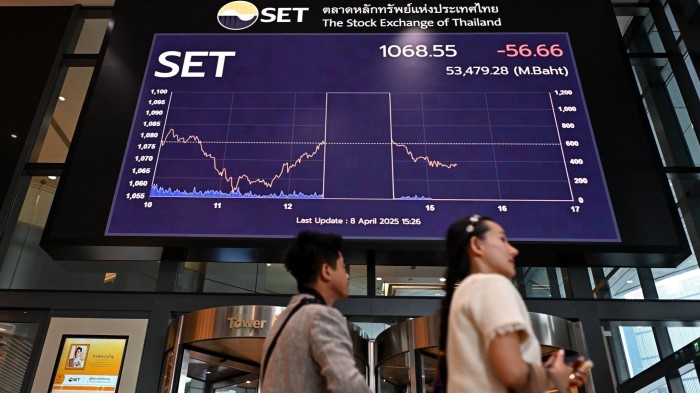Asia’s developing economies are being squeezed by Donald Trump’s tariff blitz and China’s retaliation after years of benefiting as low-cost hubs for US exports.
Stock markets of emerging nations, mainly part of the Asean group of countries in south-east Asia, have been among the year’s biggest losers from the turmoil created by the US president’s trade policies.
Despite rallying on Thursday following Trump’s 90-day tariff reprieve, the stock markets of countries such as Taiwan, Thailand and Vietnam are deep in the red this year.
Known as China-plus-one nations as western manufacturers snub Beijing and set up manufacturing bases in these countries, they are now hostage to the escalating trade war between the world’s two biggest economies.
“With this global tit-for-tat trade war, businesses will probably want to pause fresh investments given all the uncertainty going on,” Brian Lee, an economist with the region’s Maybank Investment Banking Group, warned.
“You will probably see slower reconfiguration of supply chains to Asean, at least in the short term.”
The main index of Taiwan, where exporters of textiles and electronics have shifted factories from China, is down about 18 per cent for the year in dollar terms, despite a near 10 per cent surge on Thursday.
Thailand’s stock market has followed a similar pattern, 18 per cent lower this year in dollar terms, despite a 5 per cent jump on Thursday.
Vietnam’s Ho Chi Minh index is still down about 9 per cent for the year in dollar terms, even after rising nearly 8 per cent on Thursday after the US suspended a 46 per cent tariff the day before.
Trump’s pause offers immediate relief, but trade uncertainties and rising tensions between the US and China — the main trading partner of Asean countries — pose big challenges.
Economists warn that Trump’s focus on Beijing, which is facing US tariffs of at least 125 per cent, could lead to dumping of cheap Chinese products into south-east Asia, putting pressure on domestic manufacturing industries.
The broader trade tensions could also slow foreign investments which have driven growth in a region that manufactures goods from Apple MacBooks to Nike trainers.
Over the past 10 years, Vietnam’s stock market doubled in dollar total-return terms as investors bet that factories backed by multinationals such as Nike and Samsung would boost the earnings of a young population in an economy officially projected to grow 8 per cent this year.
At the same time, the boom also brought diversion of Chinese goods, such as solar panels, through Vietnam to avoid US trade barriers on Beijing from Trump’s first term.
That increasingly attracted US ire, even before Trump’s re-election. Vietnam has a $123.5bn trade surplus with the US — the third largest after China and Mexico.
The so-called trans-shipment of goods diverted through these Asian economies by Beijing to the US could still pose problems.
“China’s retaliation actually complicates Vietnam’s and other [economies’] negotiation with US, due to worries on Chinese firms exploiting Vietnam and others as a backdoor to dodge tariffs,” analysts at Japanese bank MUFG said.
However, some investors are looking to markets that are less reliant on US exports or could trade more within the region.
“Many of these countries were already moving from US exports to a more intraregional trade model. This trend, which is at a reasonably early stage in many countries, is only going to move forward,” Edward Evans, emerging market equities manager at Ashmore, said.
Countries such as Indonesia also have room to cut rates to boost growth if the global economy darkens, he added.
In addition, many of these countries, worst hit during the 1997/98 Asian financial crisis, have piled up foreign reserves to avoid a repeat.
As the Indonesian rupiah tumbled this week past levels last seen in 1997/98, the central bank could draw on reserves of about $155bn, or enough to cover nearly seven months of imports, to intervene in support of the currency.
For Hanoi, however, gross foreign exchange reserves make up less than three months of imports. Vietnam does not have “unlimited firepower to counter FX weakness”, Michael Wan, senior currency analyst at MUFG, said.
At the same time, the “country’s competitive edge will ultimately shine over the medium term”, he added. That includes Vietnam’s relatively cheap labour supply and its proximity to trade routes.
“The whole reason China is allocating a lot of its own manufacturing to places like Vietnam is because of cost,” James Johnstone, co-head of emerging and frontier markets at Redwheel, said.
“The idea that we will have the production of iPhones or textiles in the US is very hard to think [about], even under the most extreme tariff conditions.”
Read the full article here




